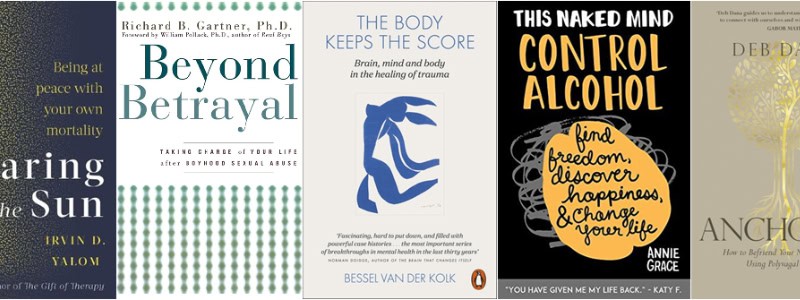As a writer and a counsellor, I’m always seeking books that deepen my understanding of the human psyche and inspire my storytelling. Over the years, certain books about mental health have profoundly shaped my personal journey and influenced the characters and themes in my work. These 5 powerful books not only changed my life but are likely to inspire my future novels. Here’s why they matter so much to me.
1. Staring at the Sun by Irvin D. Yalom
I struggled with death anxiety for a while. Not severely, but enough to unsettle me. I would lie in bed at night and picture the Earth spinning and unlimited time pass and I couldn’t phantom not being a part of that. I would have an actual visceral response to it. This book (and my therapist) taught me a constant awareness of death can be beautiful, because it reminds us of the fragility of life and the importance of living in the moment.
- Why It Resonates: This book explores the existential fears we all face, particularly the fear of death. Yalom’s approach to therapy—grounded in deep empathy and existential philosophy—reminded me of the power of confronting life’s ultimate questions.
- Impact on My Writing: The themes of mortality and meaning are central to many of my characters’ arcs. Yalom’s insights help me craft moments where my protagonists wrestle with their fears and find purpose in their struggles. Most of Seb’s voice in What to Live Life Like (scheduled to come out this summer) was inspired by this.
2. Beyond Betrayal by Richard B. Gartner
I was groomed in my teenage years and this book really helped me make sense of the trauma. It’s a very comprehensive read—addresses every facet of boyhood sexual abuse you can possibly imagine, and really helped me move forward. There’s a lot of stigma around men who’ve been abused, so every opportunity I get to talk about this book, I take.
- Why It Resonates: Gartner’s work delves into the impact of betrayal trauma, particularly in male survivors of abuse. The compassion and understanding he brings to this sensitive topic are transformative.
- Impact on My Writing: This book has been instrumental in shaping complex, layered characters who grapple with trust and vulnerability. It’s also influenced how I depict emotional healing, showing that recovery is possible even in the face of deep betrayal. My third novel, Where to Go With This (scheduled for publication next year), uses this book as a foundation. I’m planning to one day write a story that showcases Gartner’s work more vividly.
3. The Body Keeps the Score by Bessel van der Kolk
If you’re a counsellor who works in a trauma-informed way, this book is a must-read. It helped me understand how trauma doesn’t ‘just’ affect the mind, but also how it affects someone’s biology.
- Why It Resonates: Van der Kolk’s groundbreaking work on trauma and its effects on the body is both eye-opening and empowering. He highlights how trauma is stored physically, not just mentally, and offers pathways to healing.
- Impact on My Writing: This book has revolutionised how I portray trauma in my stories. By understanding how characters might carry their pain physically, I can write more authentic and relatable experiences of healing and resilience. Duncan’s panic at the idea of seeing Tristan again in How to Understand Him is a good example of how trauma can manifest as a physical response. Additionally, his transition in going from a mother who was emotionally abusive to a partner who’s just as abusive illustrates how deeply his belief system had been impacted, and how distorted his ideas were on how people are allowed to treat him.
4. This Naked Mind by Annie Grace
Embracing a sober life is one of the best decisions I’ve ever made. Since I quit drinking in 2023, I have more energy, sleep better, and have stopped suffering from anxiety. I feel more resilient and stronger within myself. I’d always suspected my drinking was a problem, but this book really helped me see how insidious alcohol is, especially in a society where drinking culture is normalised and constantly promoted. This book dives into the beliefs we may have built around our drinking—and explains why they’re not true.
- Why It Resonates: Grace’s exploration of alcohol addiction and the societal norms surrounding drinking is both candid and cathartic. Her approach to dismantling these norms through self-awareness and empowerment struck a chord with me.
- Impact on My Writing: I’ve somewhat explored addiction through Duncan’s mum in How to Understand Him—how the consequences of her gambling has impacted her family. I did struggle with the fact that she doesn’t find healing in the story, but that’s the sad reality of addiction sometimes. It’s an extremely powerful disease (more powerful than the love someone has for their family). If you keep a close eye, you’ll notice as well that I make a distinction in my writing between characters who don’t struggle with addiction and who therefore drink responsibly, and characters who use alcohol as a coping tool. I’m toying with the idea to explore porn addiction in my fiction at some stage.
5. Anchored by Deb Dana
Deb Dana’s concept of seeing the nervous system as a ladder is very helpful. Dorsal sits at the bottom and is the Immobilisation System: freeze, shutdown, dissociation, surrendering to death, etc. Above that is the Sympathetic Nervous System, also known as the Mobilisation System. This is where fight and flight live. They’re responses to danger: emotions of rage, anger, frustration, fear, panic, anxiety, worry, etc. At the top is the ventral Vagal System, which is where social engagement takes place. From this place, we can meet others in our environment with feelings of harmony, bonding, safety, joy and peace. People move up and down the ladder.
- Why It Resonates: Dana’s work on polyvagal theory offers a framework for understanding how our nervous system shapes our emotional responses. Her emphasis on creating safety and connection is deeply impactful.
- Impact on My Writing: The idea of anchoring characters—emotionally and physically—has enriched my storytelling. Dana’s insights help me craft relationships and interactions that reflect the importance of safety and trust. It also provided helpful insight into how characters respond emotionally to situations, and why.
How These Books Influence My Future Work
Each of these books has left an indelible mark on me, both personally and professionally. They’ve helped me deepen my understanding of mental health, which in turn has enriched my characters and narratives. As I look to future projects, I know the themes and insights from these books will continue to inspire me, encouraging me to write stories that resonate with authenticity and compassion. My future works will undoubtedly explore childhood sexual abuse, trauma, and the impact of addiction.
What About You?
Have you read any of these books, or do you have favourites that have shaped your understanding of mental health? I’d love to hear about the books that have inspired you—share your recommendations in the comments below! Finally, are there any books you’d like me to use as a foundation for my next novel?


Leave a Reply